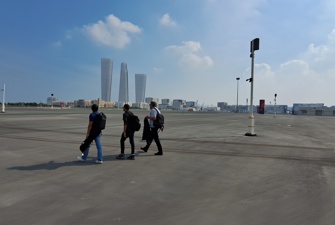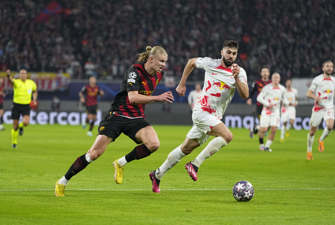Football may unite the world, but FIFA works to divide it
OPINION: FIFA’s president rolls out the red carpet for future cooperation with autocrats at his opening press conference at the 2022 World Cup. Democratic football federations must speak up, and they need support from their governments.
It may have provoked smiles and laughter in disbelief when the ruler of world football, Gianni Infantino, used a press conference on the day before the opening of the FIFA World Cup 2022 in Qatar to give a long lecture about what human rights, colonialism, oppression, and world politics is really about.
“Today I feel Qatari. Today I feel Arab. Today I feel African. Today I feel gay. Today I feel disabled. Today I feel a migrant worker,” Infantino said with an emotional gravity that is usually reserved for funerals. And the press conference may have been the beginning of a funeral of a football organisation based on democratic values.
In his flamboyant speech, Infantino accused Western critics of the human rights situation in Qatar of being outright racist. He asked Europe to consider its own history before passing judgments on others:
"For what we Europeans have been doing around the world in the last 3,000 years we should be apologising for the next 3,000 years before starting to give moral lessons to people,” Infantino said while giving FIFA – and not human rights activists, athlete groups, and the media – credit for the public pressure on Qatar’s authorities to improve conditions for the more than two million migrant workers in the host country.
The FIFA president even included his own childhood experiences of being bullied because of his red hair as to prove his special preconditions for feeling empathy with people that suffer.
The emotional outbursts overshadowed that FIFA would actually open its “compensation legacy fund for anyone who wants to invest in it” – without making FIFA’s own contribution clear. And FIFA would cooperate in creating a “Labour excellence hub” in Qatar with UN agency.
The organisers had not invited hundreds of migrant workers dressed in FIFA sportswear to cheer Infantino in the same style as the groups performing as football fans in the streets of Doha over the past week. Had they done so, their gratitude over the above promises may have been cooled down by Infantino’s defense of their exploiters based on the argument that they earn better in Qatar than at home.
They might also have felt intimidated by hearing Infantino identifying himself as a migrant worker. He is indeed a migrating person, restlessly touring the world for money and personal support, but under luxury conditions the migrant workers only are allowed to experience as they build them.
But leaving sarcasm and disbelief to the side, it is worth to take Gianni Infantino’s rant very seriously.
The FIFA President’s personal and pathetic discourse reflects a well-considered strategy. By assuming the role of a victim and accusing critics of racism, he reflects the sentiments of parts of the Arab world, but his message reaches much further.
Ever since the Brazilian João Havelange took power at FIFA half a century ago, FIFA leaders have officially identified with the scepticism in poor countries towards the richer world, even if the high-ranking FIFA officials personally developed the lifestyle of the global elite.
This identification has served to give the FIFA executives political legitimacy among the vast majority of national football associations that come from underprivileged countries. But at the same time FIFA always had to cater for media companies, governments, and sponsors from the Western world, who have thrown endless funds into FIFA's money tank in return for marketing and broadcasting rights.
The redistribution of FIFA’s money down to the level of national federations has had the appearance of a solidarity policy, and perhaps also sometimes worked as such, but no one can question that it has also laid the foundation of endemic corruption in world football where cash has flowed to private bank accounts in exchange for votes, events and contracts.
Freeing FIFA from the West?
If anyone had hoped that the revelations of FIFA scandals over the past 20 years, the efforts of investigative journalists, the criminal convictions, the governance reforms, the player and fan activism – if anyone had hoped this would at the end lead to a more transparent and democratic FIFA, Gianni Infantino disappointed them today.
His statements at the press conference seem to confirm that he expects FIFA to be able to free itself much more from Western democracies and rely on contributions from Saudi Arabia, Qatar, China and other authoritarian states where human rights are mostly window dressing in celebratory speeches and political declarations.
In the ongoing global battle between dictatorship and democracy, Infantino clearly joins the club of democracy's opponents. He does so, among others, by saying that FIFA is entitled to make its own definition of human rights - just as Xi Jinping, Putin and all other authoritarian rulers do.
At the same time, like them, he accuses all Western critics of racism and hypocrisy, without the slightest evidence, of course. It is a diversion from the real and well-documented problems in the 2022 World Cup, like when he asks Europeans to apologise for 3.000 years of history before targeting other continents.
For the record, Western criticism of FIFA and Olympic corruption has been directed at a majority of old white men running sports governing bodies, and now at Gianni Infantino. Is that racism?
That wealthy authoritarian Arab leaders have contributed to the corruption in recent years is a fact that has nothing to do with racism. The criticism from Play the Game and many others is aimed first and foremost at strengthening democracy, transparency and open debate, based on the best available facts.
It is now up to those football associations who still believe in democracy and value-based sport to distance themselves from Infantino's attempt to own the definition of human rights and downplay the challenges on the ground.
They might also remind Infantino of FIFA's own slogan "Football unites the world". It may do, but the FIFA President now seems determined to create divisions.
Challenge to Europe
With his statements, Infantino challenges UEFA in particular. UEFA should be deeply concerned about FIFA's intensified anti-European stance. On the political and commercial side of football, Infantino has spent his entire presidency trying to undermine the dominance of European football.
FIFA has a long tradition of opposing European football, but Infantino is apparently stepping up this game after finding an immensely wealthy and powerful ally in Saudi Arabia and its omnipotent ruler Crown Prince Mohammed Bin Salman. The fact that Infantino has now also established residence for himself and his family in Qatar is also a signal of strong diplomatic ties with that part of the world.
Infantino's alliance with the Saudis lays behind the proposals for a World Cup every two years, an expanded number of World Cup participants and a global club tournament. All these initiatives are meant to reduce the dominance of European football.
Although Infantino has so far suffered defeat in all his reform packages, it is probably a matter of time before he has secured enough financial backing to implement some of the ideas. Saudi Arabia is prepared to pay a very high price to be awarded the World Cup in 2030.
It is time UEFA recognises that Africa, Asia and Latin America need European support to build sustainable tournaments of their own. UEFA must think carefully about how to show more international solidarity and prevent the future of football from being placed in the hands of the world's most authoritarian powers – many of whom are already entering UEFA by the front door through club ownerships and political positions.
Governments must help
It is highly doubtful that sports governing bodies in democratic countries can meet the challenge without help from their elected governments. After all, the movements within FIFA and the IOC are supported and increasingly controlled by very powerful states.
The situation requires democratic governments to overcome their scare of the power of the Olympic family. Over the past 25 years, U.S. authorities have repeatedly shocked international sports leaders who believed to be untouchable, through police raids, financial threats and strengthened legislation.
European countries should learn from this, both at the national level and in cooperation forums such as the EU and the Council of Europe. Authoritarian states have gained control over sport thanks to massive investments and clever long-term strategies, and it is high time democracies up their game.







